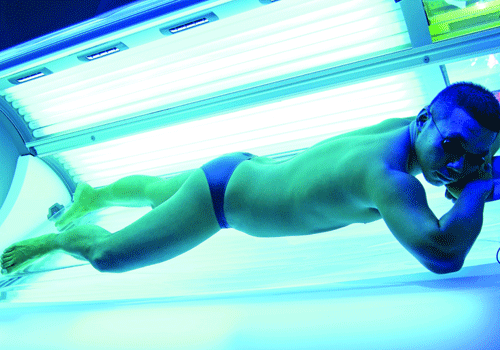Society
Back to the Bronze Age
Updated: 2011-09-26 07:54
By Zhang Xi (China Daily)
|
In a nation where white skin is praised, tanning salons are doing their best. [Jiang Dong / China Daily] |
While most Chinese people, especially women, try to cultivate a paler hue of skin color, some are starting to go for the sun-kissed look.
In sophisticated cities such as Beijing and Shanghai, tanning salons are slowly popping up.
"Our business has grown quickly in the past couple of years," says Tao Ran, manager of Mega Sun tanning salon in Beijing. When the salon opened in 2009, it had a hard time drumming up business. But now, he boasts, there are more than 5,000 members.
During business hours, from 10 am to 9 pm, the four tanning beds are rarely empty, he says
"Normally, a customer lies on a tanning bed for eight to 10 minutes, which costs 47 yuan ($7) to 60 yuan," Tao says. "We don't encourage them to tan for a long time to earn more money. Everyone's skin condition is different. Our instructors provide professional suggestions to every member."
He says about 70 percent of customers are Chinese and 60 percent of clients are male. "Many of them are models and entertainers. Some people born in the 1990s are also tanning to be different."
The company's tanning beds were imported from Germany, Tao says, with the most expensive costing 600,000 yuan.
"I am positive about the future of the tanning market in Beijing and am preparing to open a branch here."
But the closure of China's first tanning club in 2011 may show the fair-skinned ideal is still prevalent today.
MH tanning salon, which opened in Shanghai in 2004, attracted media attention because some believed it would lead the tanning industry to blossom in China.
"We closed our salon this year since it wasn't profitable anymore," says Alex He, co-owner of the salon.
In 2006, MH salon attracted more than 10,000 customers to soak up rays, most of them foreigners.
The future of tanning salons is uncertain, because those with darker complexions are divided into two categories. One group thinks they should keep their skin bronzed and can't bear to see their skin become white again. The other group doesn't want to be tanned, since they are negatively perceived by most of society.
Xu Lin is a white-collar employee in Beijing who spends her lunch breaks visiting a tanning salon.
"I love to travel and often sunbathe overseas. I believe bronzed skin makes me look healthier and more fashionable. My skin looks silky after being tanned. My boyfriend says I am more confident and attractive now."
Zhao Zhao was sent to study in Britain for a year by her company and recently returned to Beijing. She frequently visited tanning salons.
"When I was flying back to Beijing, I believed my friends would be jealous of my sun-kissed skin, since I looked more European," she says.
But she received the opposite reaction from her family and colleagues.
"My female colleagues kept advising me to used various kinds of skin-whitening products. They believed I must have had a hard life abroad. Even my mom thinks I suffered a lot because of my brown skin."
While skin-whitening products have been available in China for years, their tanning counterparts can hardly be found.
"The tanning industry can't shake Chinese people's deep-rooted view of skin tones, though a few people, including women, are starting to accept tanning. Their numbers can't be compared with that of their skin-whitening counterparts," says Xiao Bu, a skin care specialist who is a guest host of TV programs.
Experts also warn indoor tanning may pose a health risk.
According to a report in 2010 by the US Food and Drug Administration (FDA), sunlamps and tanning beds promise consumers a bronzed body year-round, but the ultraviolet radiation from these devices can pose serious health risks if the skin is exposed to UV rays for too long.
E-paper

Pearl paradise
Dreams of a 'crazy' man turned out to be a real pearler for city
Literary beacon
Venice of china
Up to the mark
Specials

Power of profit
Western companies can learn from management practices of firms in emerging economies

Test of character
Keyboard-dependent Chinese are returning to school because they have forgotten how to write

Foreign-friendly skies
About a year ago, 48-year-old Roy Weinberg gave up his job with US Airways, moved to Shanghai and became a captain for China's Spring Airlines.

